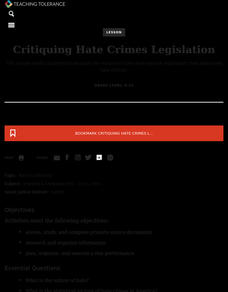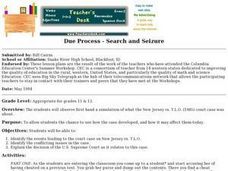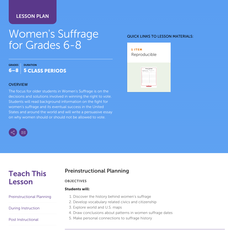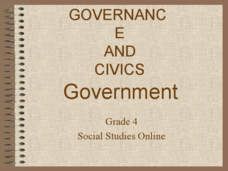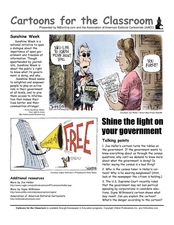Judicial Learning Center
The Appeal Process
Why doesn't the Supreme Court hear testimony from witnesses? How do they complete an entire proceeding in less than two hours? A helpful lesson guides scholars of criminology through these and other questions by explaining how appeals...
PBS
The Meaning of the Fourteenth Amendment
The Fourteenth Amendment was extremely important to civil rights and is a crucial one to remember. The resource teaches about the Supreme Court decisions related to the amendment through writing exercises, reading, and working in small...
iCivics
Sortify: U.S. Citizenship
What is the difference between a right and a responsibility? Scholars consider the question while sorting characteristics of citizenship into buckets using a video game. After playing, class members see how effectively they sorted the...
Syracuse University
Women's Suffrage Movement
Women gained the right to vote in the twentieth century, but the fight for equality dates back centuries. Using an invitation to an 1874 suffrage convention, eager historians consider the motivations behind supporters of the suffrage...
Teaching Tolerance
Using Photographs to Teach Social Justice | Legal Action: The Supreme Court
A social justice lesson focuses on the Supreme Court case Loving v. Virginia which struck down laws that prohibited marriages between African Americans and white Americans. The lesson begins with class members examining a photograph of...
Judicial Branch of California
The Power of the Press: The First Amendment
Was what happened in 1886 at the Haymarket riot a crime or a case of xenophobia? Using political cartoons from the time, young historians consider the role the media played in anti-labor sentiment during the time and how that influenced...
K20 LEARN
Electoral College: Does My Vote Count?
How can a candidate get the most votes, yet still lose the race for the presidency? This is has happened more than once in American history, including in the elections of 2000 and 2016. Using an activity for creating group notes, young...
C-SPAN
Should Your State Modify Its Voter Registration Laws and Methods for Submitting a Ballot?
What is the balance between democracy and security? Using articles and videos that examine state voting procedures, learners explore the difficult question. After looking at voting regulations in their state and nationally, they consider...
Teaching Tolerance
Critiquing Hate Crimes Legislation
The high school instructional activity explores what hate crimes are and how the government has responded to those crimes. Academics read legislation, analyze political cartoons, and complete hands-on-activities to understand what...
Teaching Tolerance
Parallels Between Mass Incarceration and Jim Crow
Is history repeating itself? A riveting lesson examines the parallels between mass incarceration in the U.S. and the Jim Crow Laws of the past. Academics review Jim Crow Laws and compare them to mass incarcerations of African Americans....
DocsTeach
Senators' Pay in the First Congress
Senators are public servants but they do get paychecks. The activity focuses on historical analysis and a treasury document from the first Congress. Scholars read the document, answer questions, and participate in group discussion to...
DocsTeach
Prohibition and Its Consequences
Organized crime and speakeasies ... just another day during Prohibition. An intriguing activity explores the world of Prohibition and its consequences on life in the United States. Scholars analyze primary sources and place them on a...
Newseum
‘45 Words' Video Lesson
A short video introduces viewers to the political struggles involved in passing the First Amendment and the many challenges it has faced since its passage. Viewers then discuss how to balance issues of freedom of the press, national...
Curated OER
For The Sake Of Security: U.S.A. Patriot Act & Bill of Rights
A substantive New York Times article about the U.S.A. Patriot Act, military tribunals, racial profiling, and the Bill of Rights forms the basis for a discussion of the complex interplay of fundamental American rights and the aftermath of...
Curated OER
Due Process - Search and Seizure
Help your 11th and 12th graders gain a deeper understanding of Supreme Court decisions and law. The activities include role-play, research, and script writing that all focus on search and seizure laws pertaining to one particular case...
National Endowment for the Humanities
The "To Do List" of the Continental Congress
What is on your to-do list today? The second lesson of a three-part series on Lost Heroes of America investigates the laundry list of items in front of the second Continental Congress. Scholars research, analyze, and present information...
Curated OER
The Bill of Rights in Current Events
Divided the class into pairs, each group is assigned one of the amendments. They use the internet to research current cases and issues involving their amendment. They are then lead into the introduction to some of the basic concepts of...
Scholastic
Women's Suffrage for Grades 6–8
Learners study the decisions and solutions involved in winning the right to vote. After reading background information on the fight for women's suffrage, including one woman's story, and its eventual success in the United States and...
Curated OER
Is Everyone Protected by the Bill of Rights?
Who is protected by the Bill of Rights? Learners examine the Bill of Rights and conduct research regarding gay people in the military. They use their research findings to prepare for and participate in a debate regarding the military ban...
Curated OER
Picture Books and the Bill of Rights
Students identify the basic freedoms of citizens in the United States. In this Bill of Rights lesson, students act out scenarios about the Bill of Rights. Students create a picture book describing the rights they've acted out.
Curated OER
Cartoons for the Classroom: Why is Freedom of Speech a Burning Issue?
In this current events worksheet, students analyze a political cartoon about the freedom of speech and respond to three short answer questions
Curated OER
Governance And Civics: Grade 4
This PowerPoint provides elementary students with a basic overview of the structure and workings of the US Government. Students will be introduced to the 3 branches of Federal and State Government, the Bill of Rights, and Amendments 1,...
Curated OER
Cartoons for the Classroom: Shine the Light on Your Government
What don't we know about our government? Explore the concept of transparency and freedom of information throught this analysis handout, in which scholars examine 2 political cartoons. Background information provides context, explaining...
Project Tahoe
Does the Use of Torture on Enemy Combatants Violate the 8th Amendment?
Tackle ethics in your high school history classes with a Socratic seminar about torture as a means for obtaining information. The plan allows for pupils to take the reins during the seminar. On the first day, class members read several...










